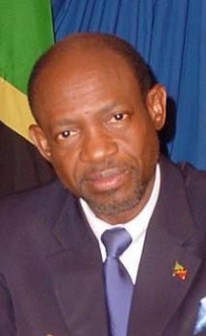Outgoing Chairman of the Caricom Conference of Heads of Government (HoGs) Dr Denzil Douglas said the people of the region should be proud of the community’s leadership on tackling Non Communicable Diseases and to ensure the community’s livelihood.
In his Christmas message to Caribbean Community, Dr Douglas, who is also the Prime Minister of St Kitts and Nevis, urged the region to reflect on Caricom’s achievements over the past year, recalling “the challenges spawned by the current period of global uncertainties,” which served to strengthen the region’s resolve to drive the integration movement forward, which has the firm commitment of the region’s populace. He reiterated his commendation to the people for their resilience and other qualities that have enabled the community to remain a symbol of stability and good governance, reflected in its embrace of democratic processes.
According to the Caricom Secretariat, Dr Douglas said the challenges, including those directly related to the global economic and financial crises, have honed Caricom’s attention particularly on finding creative ways to confront them. “We have sought, for example, to encourage foreign investment from new areas and welcomed the interest shown by India, China and Japan, all of whom mounted trade and investment missions to the region seeking opportunities,” he said. “The continuing increases in the prices of food and the search for food sovereignty have engaged our attention as a community,” he added. The Chairman added that stakeholders in the agriculture sector, as evinced most recently in Dominica where they participated in the Caribbean Week of Agriculture, are working assiduously to find a solution to those particular challenges. He then called on the community to continue to support them by buying and consuming locally grown food – which is not in any way in short supply – in order to lower the very high food import bill, and at the same time, maintain healthy lifestyles.

In advancing the latter ideal, the Caribbean Community can take pride in the fact that it has provided the leadership to appropriately position on the international stage, the threat of Non-Communicable Diseases (NCDs), he said. As a result of the Community’s tireless advocacy, the United Nations (UN) General Assembly agreed to convene a High Level Meeting (HLM) on NCDs, which was held in September in New York, although the outcome may not have been as ambitious as the region had envisaged, the chairman noted. “Regionally, we have made great strides in initiating operations of the Caribbean Public Health Agency (CARPHA), a consolidation of five regional health institutions. The Agency, I am pleased to announce, will come on stream early in the New Year,” he said.
Dr Douglas also said that the Community’s solid achievements in health have extended also to successes recorded by the Pan Caribbean Partnership Against HIV/AIDS (Pancap). He reassured the people of the region that that their livelihoods and well-being have been at the forefront of the HoGs’ agenda and that they have placed much emphasis on youth development. “In the last quarter of this year, we boosted our campaign against youth gangs and gang violence with interventions across the region that have yielded encouraging results and which will determine our response going forward,” he said.
According to the chairman, a major factor in ensuring that well-being and existence remain priority is the HoGs’ commitment to the adaptation and mitigation of Climate Change. Earlier this month, at the UN Climate Change Conference in Durban, South Africa, HoGs continued their advocacy for attention to be paid to the deleterious effects of climate change on the natural environments and the economies of small states. One of the outcomes of the Durban Conference was a decision by parties to adopt a universal legal agreement on climate change as soon as possible, and no later than by 2015. The Community, in particular through Grenada’s leadership of the Alliance of Small Island States (AOSIS), ensured that several concerns were addressed in the outcome document.
It also continued its quest to cement relations with Third States and Groups of States with some emphasis on those in our Hemisphere. According to Dr Douglas, a plan of action for closer co-operation and joint initiatives was drawn up with the Integration System of Central America (SICA) in a range of areas and work has begun through the two regional Secretariats to ensure that these initiatives make an impact on the lives of the people of both regions.
In addition, Dr Douglas said he was particularly pleased to participate in the Fourth Caricom-Cuba Summit held in Trinidad and Tobago earlier in December, where the Community renewed and advanced its longstanding relationship with Cuba. “There are also meaningful people-centered activities arising out of that encounter in health, agriculture, infrastructure building and culture, which would doubtlessly improve the well-being of our citizens,” he said.
“As we look back on 2011, we can do so with a measure of comfort that we have fulfilled the charge delivered at the beginning of the year by my predecessor, the Hon. Tillman Thomas, Prime Minister of Grenada, to make 2011 a “watershed year,” a year when a new generation of leaders would take their place in the Community,” the chairman said. He noted that at that time, the HoGs were confident that they would weather the multiple storms that were facing by dint of strengthening community bonds, cooperating with each other and utilising all the skills available to us.
“In our era of new beginnings, one of my first tasks as Chairman of the Community was to install Ambassador Irwin LaRocque as the new Secretary-General… an occasion which, for me, heralded a turning point in the history of our community. He has begun the task of finding creative ways to chart the community’s course in the current global environment,” he explained. Dr Douglas noted that as the community contemplates resolutions for the New Year, it should pledge collectively to cooperate to build on the founding fathers’ dreams of regional integration, securing a community for all for generations to come.





